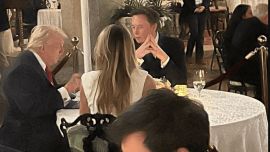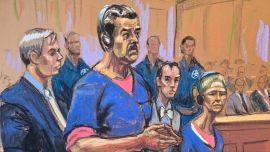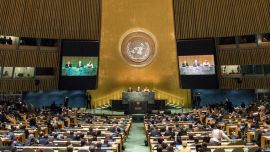Could last weekend’s Spanish elections – where the losers were the winners, not only the PSOE Socialists but also the Catalan separatists – be the shape of things to come here, back to the future after the 2003 loser (the late Néstor Kirchner) ended up in the presidency? The Spanish deadlock stems from the collapse of a two-party system which remains in limbo here with fragmentation and polarisation equally likely scenarios. Last Sunday’s mayoral elections in the provincial capital of Córdoba (voting on the same day as its Andalusian namesake) failed to answer that question – it was a polarised race with seven out of every eight voters opting for the two leading candidates but at the same time two out of every five registered citizens sat this one out, leaving plenty of potential for other parties to become competitive and confuse the outcome in future contests.
Nor was there much answer from the nationwide campaigning, which took very much a back seat to awaiting the endlessly receding agreement with the International Monetary Fund (IMF) in an “It’s the economy, stupid” week – a black hole for hard news. Yet that crucial IMF agreement could in turn be on hold for the PASO primaries now only a fortnight away which should go a long way towards anticipating the final electoral verdict or at least telling us to which of the two extremes it will be closer – to the polarisation of the last election in 2019 with the two main coalitions commanding almost 90 percent of the vote or the fragmentation of 2003 with no candidate even reaching a quarter of the vote, thus potentially echoing all the uncertainties now facing Spain and offering no real way out of crisis.
One key factor deciding whether the pendulum will swing towards polarisation or fragmentation will be the force of the libertarian challenge mounted by Javier Milei whose style more than substance offers angry voters an outlet. Milei has previously come under attack for his venal candidacies (presented as a scandal by his critics but also a logical expression of his extreme market philosophy) while his recruitment of economists of the Carlos Menem era such as Roque Fernández and Carlos Rodríguez invited speculation that he was tapping that neo-conservative Peronist vote – a more recent accusation (intensified last week) has him allowing Economy Minister and government presidential candidate Sergio Massa to define his candidates in Buenos Aires Province at least in a bid to erode the Juntos por el Cambio mainstream opposition from the right. Whether such charges dent Milei or give him the muscle so conspicuously lacking in all his provincial results so far remains to be seen.
Great expectations surrounded the Córdoba election but a deputy mayor smoothly succeeding the outgoing mayor (and future governor) does not leave too much to say in retrospect. Determined to go one better than the previous weekend’s Santa Fe voting when a Juntos por el Cambio landslide more than doubled the Peronist haul but the national leadership divided its forces between two bitterly rival gubernatorial hopefuls, the opposition helm this time ensured an impressive unity photograph to celebrate a triumph which never came. Used to a head start when campaigning against a failed Kirchnerite presidency, the opposition found itself at loss for a strategy when the local Peronist government bashed Kirchnerism at least as hard as they do (even if their resentment of the national capital is directed as much against its City Hall as its federal government).
The number-crunching of the Córdoba mayoral election yields the following – over 87 percent voted for just two of the 11 candidates in a highly polarised race while at the other end five of those 11 (including Kirchnerite Humberto Spaccesi with just 3,200 votes) could not even reach 0.5 percent of the vote and thus merit no further mention. Peronist Deputy Mayor and now mayor-elect Daniel Passerini led throughout the night with his margin always around seven percent to finish with 312,812 votes or 47.7 percent as against exactly 40 percent for Radical deputy Rodrigo de Loredo (262,254 votes) representing Juntos por el Cambio. The other main national forces were nowhere in sight with 2.9 percent for Frente de Izquierda y Trabajadores-Unidad candidate Laura Vilches trailing in third place while the libertarians flopped yet again with Verónica Sikora finishing fifth on 1.8 percent. The independent Encuentro Vecinal Córdoba with a purely municipal focus split its vote between two candidates – Juan Pablo Quinteros (2.4 percent) and César Orgaz (1.7 percent). Only 655,693 citizens out of an electorate of 1,133,316 (larger than 18 of the 23 provinces) cast valid votes, or a turnout of just over 60 percent if almost 25,000 blank or spoiled ballots are also included (a turnout substantially down from 72 percent in 2019 and 68 percent at provincial level last month).
If Córdoba’s Peronist government delights in reviling its national comrades, Chubut holding its provincial elections tomorrow goes one better – there the Peronist gubernatorial candidate disowns his own governor despite the common loyalty of both men to Massa. A hazardous enough strategy, one might think, but then outgoing Governor Mariano Arcioni seems almost more of a lost cause than President Alberto Fernández. The accidental successor of local Peronist strongman Mario Das Neves as his lieutenant-governor when the latter died of cancer in 2017, Arcioni’s administration has been continually in crisis ever since due to his chronic inability to pay provincial employees in a booming oil province, thus triggering violent protests – he only managed to squeeze back into office in 2019 with less than 40 percent of the vote thanks to the massive nationwide Frente de Todos backlash against the Mauricio Macri presidency. Throughout the last six years Arcioni has remained close to Massa but the attitude of both men towards Kirchnerism has changed drastically since 2019 – in Arcioni’s case because of a constant dependence on central government bailouts.
As the mayor of Comodoro Rivadavia (by far the largest city in the province and indeed all Patagonia with well over a third of Chubut’s 603,000 inhabitants), Arriba Chubut gubernatorial candidate Juan Pablo Luque fancies his chances as long as he can distance himself from Arcioni but troubled Chubut ranks high on a list of potential opposition gains in a year when such strongholds as San Luis and San Juan have already been wrested from the Peronist grasp. PRO deputy Ignacio Torres has pursued a vigorous campaign, pigeonholing Luque as just as much of a Massa man as the hapless lame duck governor, who has even been demoted to a Parlasur candidacy (Airport Police chief José Glinski tops the Peronist list for Congress) – Arcioni and Luque also share their running-mate, having current lieutenant-governor Ricardo Sastre in common. Yet after Senator Carolina Losada in Santa Fe and De Loredo in Córdoba have crashed to defeat in successive weekends after the highest hopes, Torres would be ill-advised to sing victory prematurely.
A polarised race can be forecasted with rather more confidence than who will actually win although the left should not be underestimated in such a turbulent province. Their candidate is Emilse Saavedra, who champions feminist and ecological as well as leftist viewpoints, while the other extreme is represented by César Hernán Trefflinger, Milei’s front man in this province – the only other gubernatorial candidate is provincial deputy Oscar Petersen of Margarita Stolbizer’s progressive GEN party.
Finally, an English-language newspaper should be allowed some curiosity as to how the Patagonian Welsh in Northern and Western Chubut (the region’s original settlers back in 1865) will vote.




















Comments